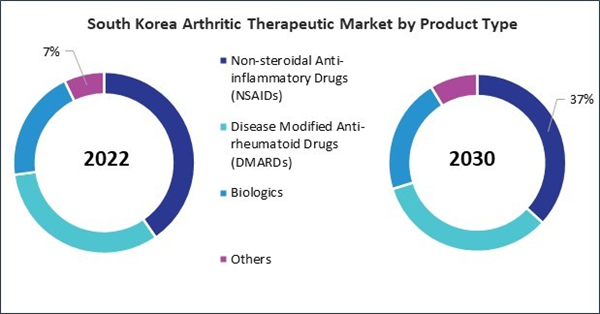The China market dominated the Asia Pacific Arthritic Therapeutic Market, by Country in 2022, and would continue to be a dominant market till 2030; thereby, achieving a market value of $7,820.8 Million by 2030. The Japan market is registering a CAGR of 5.3% during (2023 - 2030). Additionally, The India market would showcase a CAGR of 6.7% during (2023 - 2030).
Healthcare providers are more likely to adopt therapies supported by robust evidence of efficacy, safety, and long-term outcomes, while patients are more inclined to adhere to treatments that offer tangible benefits with minimal adverse effects. For instance, as per Invest India, India’s healthcare industry is expanding at a rapid rate due to its expanding coverage, services, and rising expenditures by both public and private players.
Biologic agents, such as tumor necrosis factor (TNF) inhibitors, interleukin inhibitors, and Janus kinase (JAK) inhibitors, target specific inflammatory pathways implicated in autoimmune forms of arthritis, like psoriatic arthritis, ankylosing spondylitis, and rheumatoid arthritis. These medications help suppress the immune system, reduce joint damage, and prevent structural deformities, thereby preserving joint function and improving long-term outcomes.
Telemedicine and digital health technologies enhance access to healthcare services for individuals residing in underserved or remote parts of India by overcoming geographical barriers. Digital health tools, encompassing wearable devices, mobile applications, and remote monitoring platforms, provide individuals with arthritis in India with enhanced capabilities to administer treatment remotely, trace disease activity, and monitor symptoms more efficiently. Therefore, due to the above-mentioned factors, the market will grow significantly in this region.
Based on Application, the market is segmented into Rheumatoid Arthritis, Psoriatic Arthritis, Osteoarthritis, Ankylosing Spondylitis and Others. Based on Product Type, the market is segmented into Non-steroidal Anti-inflammatory Drugs (NSAIDs), Disease Modified Anti-rheumatoid Drugs (DMARDs), Biologics, and Others. Based on countries, the market is segmented into China, Japan, India, South Korea, Singapore, Malaysia, and Rest of Asia Pacific.
List of Key Companies Profiled
- AbbVie, Inc.
- Pfizer, Inc.
- Amgen, Inc.
- Novartis AG
- F.Hoffmann-La Roche Ltd.
- Viatris, Inc.
- Bausch Health Companies, Inc.
- Sanofi S.A.
- Merck & Co., Inc.
- Bristol-Myers Squibb Company
Market Report Segmentation
By Application- Rheumatoid Arthritis
- Psoriatic Arthritis
- Osteoarthritis
- Ankylosing Spondylitis
- Others
- Non-steroidal Anti-inflammatory Drugs (NSAIDs)
- Disease Modified Anti-rheumatoid Drugs (DMARDs)
- Biologics
- Others
- China
- Japan
- India
- South Korea
- Singapore
- Malaysia
- Rest of Asia Pacific
Table of Contents
Companies Mentioned
- AbbVie, Inc.
- Pfizer, Inc.
- Amgen, Inc.
- Novartis AG
- F. Hoffmann-La Roche Ltd.
- Viatris, Inc.
- Bausch Health Companies, Inc.
- Sanofi S.A.
- Merck & Co., Inc.
- Bristol-Myers Squibb Company









